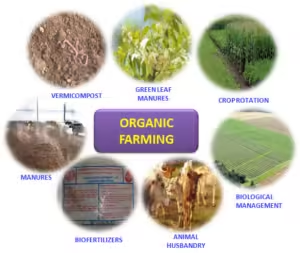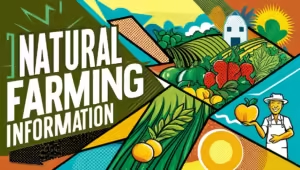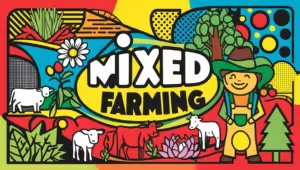- Introduction: What is Organic Farming?
- Key Principles of Organic Agriculture
- Benefits of Organic Farming
- Organic Farming Methods and Practices
- Challenges in Organic Farming
- The Future of Organic Farming
- Conclusion: Embracing Organic for a Sustainable Future
Introduction: What is Organic Farming?
In an era where environmental consciousness is growing, organic farming has emerged as a vital and sustainable approach to agriculture. But what is organic farming exactly? It’s a system that relies on ecological processes, biodiversity, and cycles adapted to local conditions, rather than the use of synthetic inputs like fertilizers and pesticides. Essentially, it’s a way to grow food that works with nature, not against it. If you’re looking for sustainable agriculture practices, organic farming is a great place to start.
Key Principles of Organic Agriculture
Organic farming is guided by several core principles. These include:
Principle of Health: Sustaining the health of soil, plants, animals, humans, and the planet as one indivisible whole.
Principle of Ecology: Working with living ecological systems and cycles, sustaining them, and emulating them.
Principle of Fairness: Building relationships that ensure fairness with regard to the common environment and life opportunities.
Principle of Care: Managing agriculture in a precautionary and responsible manner to protect the health and well-being of current and future generations and the environment.
These principles guide farmers to implement practices that promote soil health, conserve water, and maintain biodiversity.
Benefits of Organic Farming
The benefits of organic farming are numerous and far-reaching. For consumers, organic food benefits include reduced exposure to harmful chemicals and potentially higher nutritional value. For the environment, organic farming environmental benefits are significant, including:
Reduced soil erosion and improved soil fertility.
Increased biodiversity and ecosystem health.
Lower greenhouse gas emissions.
Reduced water pollution.
Many people are interested in buying organic food because they understand the advantages.
Organic Farming Methods and Practices
Organic farming methods are diverse and tailored to local conditions. Some key practices include:
Crop rotation: Alternating crops to improve soil fertility and reduce pest pressure.
Composting: Using decomposed organic matter to enrich the soil.
Green manures: Planting cover crops to add nutrients and improve soil structure.
Biological pest control: Using natural predators and beneficial insects to manage pests.
Natural fertilizers: Employing manure, compost, and other natural sources of nutrients.
Weed management: Using mulching, hand-weeding, and other non-chemical methods.
These organic agriculture practices help to create a balanced and resilient ecosystem.

Challenges in Organic Farming
While organic farming offers many advantages, it also presents challenges. These include:
Lower yields compared to conventional farming in some cases.
Higher labor costs.
The need for specialized knowledge and skills.
Certification costs and regulations.
Market access and fair pricing.
Farmers interested in transitioning to organic farming should carefully consider these challenges.
The Future of Organic Farming
The future of organic farming is bright, with growing consumer demand and increasing awareness of its benefits. Innovations in technology and research are also making organic farming more efficient and accessible. Organic farming trends indicate a growing movement towards more sustainable and resilient food systems.
Conclusion: Embracing Organic for a Sustainable Future
Organic farming represents a crucial step towards a more sustainable and healthy future. By embracing organic food production, we can protect our environment, improve our health, and ensure food security for generations to come. As consumers and farmers, we all have a role to play in supporting this vital approach to agriculture.




